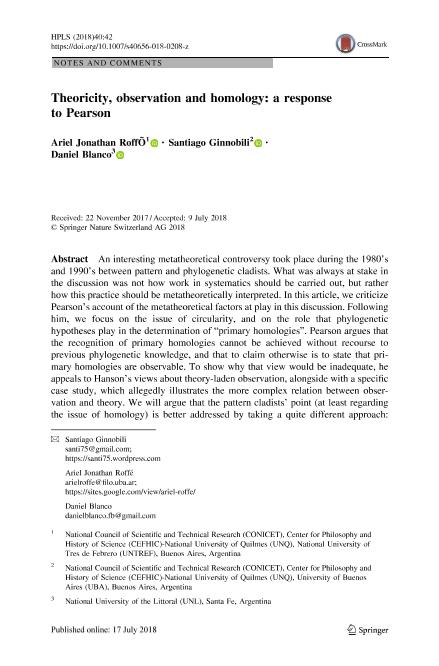Artículo
Theoricity, observation and homology: a response to Pearson
Fecha de publicación:
09/2018
Editorial:
Springer
Revista:
History and Philosophy of the Life Sciences
ISSN:
0391-9714
Idioma:
Inglés
Tipo de recurso:
Artículo publicado
Clasificación temática:
Resumen
An interesting metatheoretical controversy took place during the 1980’s and 1990’s between pattern and phylogenetic cladists. What was always at stake in the discussion was not how work in systematics should be carried out, but rather how this practice should be metatheoretically interpreted. In this article, we criticize Pearson’s account of the metatheoretical factors at play in this discussion. Following him, we focus on the issue of circularity, and on the role that phylogenetic hypotheses play in the determination of “primary homologies”. Pearson argues that the recognition of primary homologies cannot be achieved without recourse to previous phylogenetic knowledge, and that to claim otherwise is to state that primary homologies are observable. To show why that view would be inadequate, he appeals to Hanson’s views about theory-laden observation, alongside with a specific case study, which allegedly illustrates the more complex relation between observation and theory. We will argue that the pattern cladists’ point (at least regarding the issue of homology) is better addressed by taking a quite different approach: instead of thinking in terms of observability, the topic can be tackled by paying attention to the way in which concepts are determined. We will take the notion of T-theoricity from metatheoretical structuralism and show that, once the issue is discussed with the appropriate metatheoretical framework, the alleged counterexample brought up by Pearson is not problematic at all for pattern cladism.
Archivos asociados
Licencia
Identificadores
Colecciones
Articulos(SEDE CENTRAL)
Articulos de SEDE CENTRAL
Articulos de SEDE CENTRAL
Citación
Roffé, Ariel Jonathan; Ginnobili, Santiago; Blanco, Daniel; Theoricity, observation and homology: a response to Pearson; Springer; History and Philosophy of the Life Sciences; 40; 3; 9-2018; 1-8
Compartir
Altmétricas




